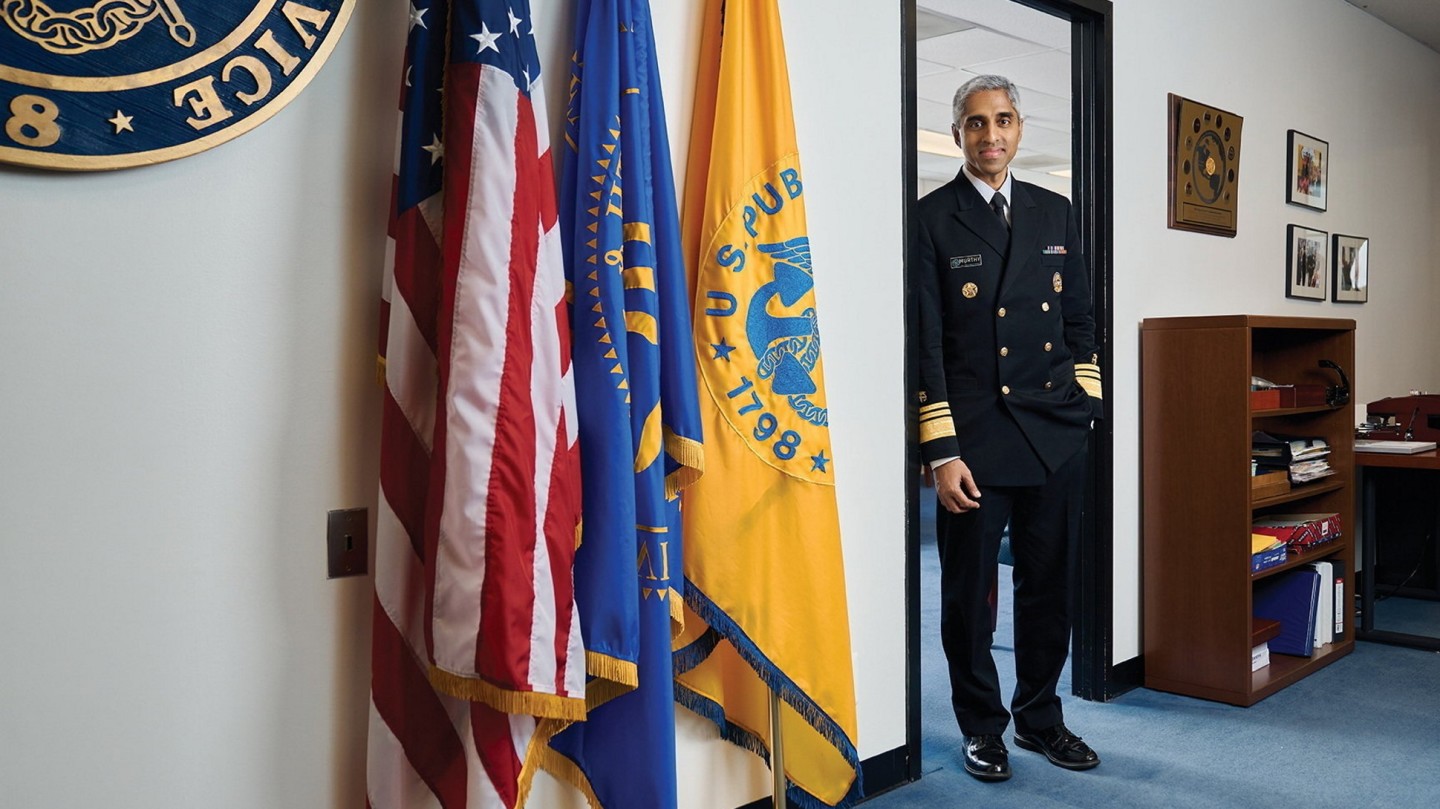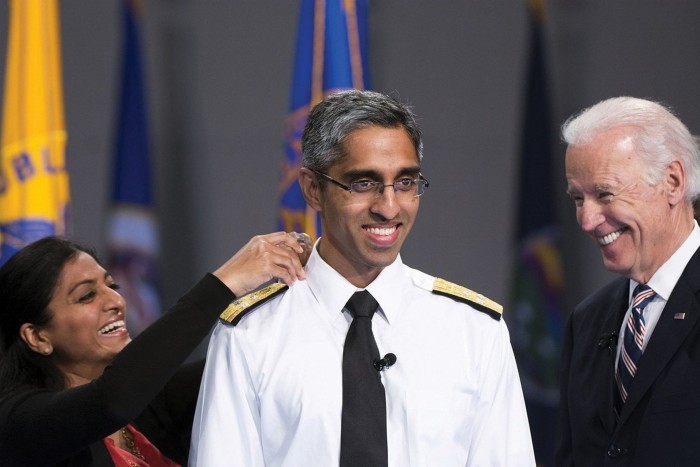What an MBA taught America’s top doctor

Roula Khalaf, Editor of the FT, selects her favourite stories in this weekly newsletter.
There was no long-term career plan, says Vivek Murthy, the 21st surgeon general of the United States. “I had never put a point on a timeline 20 years down the road and said, ‘That’s where I want to be. I’m going to work toward that.’”
Dr Murthy did attempt to plot a career course when he was young, he recalls, but found that it did not work for him. “Life kept happening, and that took me down different paths”.
Those paths led to a multitude of roles. Dr Murthy is a physician, non-profit co-founder, business school graduate, entrepreneur and author. Now, as surgeon general, his mission is to promote good health by sharing guidance and resources with the public. As vice admiral of the US Public Health Service Commissioned Corps, he also commands more than 6,000 public health officers.
This is not Dr Murthy’s first stint as the “nation’s doctor”. In 2014, he was appointed as the 19th surgeon general by then-US-president Barack Obama, becoming the first person of Indian descent to assume the role.
He faced a rocky nomination, in part due to his view that gun violence is a public health issue — a stance that riled the pro-gun lobby group, the National Rifle Association. Nor did he shy away from robust debate once in office: in 2015, for example, he published a pro-vaccine campaign during an outbreak of measles cases in the US.
Global MBA Ranking 2023

View the MBA ranking and report. Register for the February 22 Spotlight on MBA online event, and the MBA 101 guide to getting into business school
His initial tenure was cut short in 2017 when the Trump administration removed him — a move that was criticised by some as politicising the role. It was not until spring 2021 that he resumed office under the Biden government.
Born in Huddersfield, in the north of England, but raised in Miami, Florida, Dr Murthy’s career started with a chance encounter. His father had met a philanthropist who was looking to support good causes and encouraged his son to pitch an idea. With that, Dr Murthy and his sister, Dr Rashmi Murthy, co-founded Visions Worldwide, a non-profit organisation that developed education programmes about HIV and Aids in India.

“It changed my life because it began my journey in public health,” he says. “It [also] helped me recognise that I was an entrepreneur at heart, meaning that I like to find challenges that, if solved, can improve the lives of people at scale.”
Despite this early entrepreneurial streak — he also helped to start Swasthya, an organisation that trained young women to become community health workers in the south Indian state of Karnataka — he had no plan to study for an MBA. He was at Yale School of Medicine when the university developed a joint MBA/MD degree programme with its School of Management and, in 2001, he signed up.
Dr Murthy knew he “really enjoyed creating a vision, building an organisation and bringing people together to translate that vision into reality”. But experience had also shown him that he had a lot to learn about “how to build effective organisations”, he says. “And that’s why I went to business school.”
There, he gained tangible skills: organisational behaviour classes in particular have had a “profound impact” on his work. This helped him to understand “how to create a culture in an organisation that truly supports your mission and your outcome”. He learned the “various facets” of workplace culture — getting communication and leadership right, and creating an environment where people could come to work and “be valued for who they are”.
He later applied these principles when building health advocacy group Doctors for America and TrialNetworks, a software technology company that aimed to improve communication and collaboration in clinical trials. “In both of those, shaping the culture of the organisations was a central part of how I approached the work, and that was in part because of the organisational behaviour class.”
Dr Murthy also uses his knowledge of organisational behaviour as surgeon general — both in building his team and informing policy. The class opened his eyes to the broader problem that many people work in places where they do not feel valued, and this “takes a toll on the individual and the organisation”. He credits his recent work — publishing a framework that supports mental health and wellbeing in the workplace — partly to those classes at Yale.
Business school also gave him new perspectives that he had not found in healthcare. He met people who had “experienced the world very differently than I had” and learned to see change as an opportunity. In healthcare, change is viewed with caution — appropriately so, as you would not want your surgeon experimenting with new techniques while you are in the operating room, he notes.
“In business school, though, I came to look at change as a profound opportunity to reimagine what the world could look like and to make it so,” he says. “I remember when I came back to the hospital after my time in business school, I felt like I was looking at the world with new glasses on and seeing opportunity much more clearly all around me.”
CV
2021-present 21st surgeon general of the US
2019-2021 Various board roles including the US Olympic and Paralympic Committee (he joined USOPC in 2020)
2014-2017 19th surgeon general of the US
2009-2014 President and co-founder of Doctors for America
2007-2014 Chairman and co-founder of TrialNetworks
2006-2014 Attending physician and medical instructor at Brigham and Women’s Hospital, Boston, and Harvard Medical School
1997-2000 Co-founder of the Swasthya Project
1995-2000 Co-founder and president of Visions Worldwide
But, while he saw the world in a new light, as a leader he began to look inwards. The MBA made him more introspective, he says, pushing him to reflect on his leadership style and realise that this kind of analysis has to be part of how he operates.
“It really helped me understand how important it is to keep time for self reflection,” he says. “And to have a council of people around you who can help you see what you are doing more clearly, especially when you have [blinkers] on or when you have blindspots to manage.”
The importance of how he communicates as a leader was also put under the spotlight. He realised how powerful words can be — whether spoken or unsaid — and how they affect motivation. “I became much more thoughtful about how I communicated with individuals in my organisation and how I managed conflict,” he says.
Indeed, some of the aspects he feels “most regretful” about as a leader relate to how he handled conflict when setting up Visions. “Those were moments where I realised it is not enough just to be right,” he says. “What matters is how you communicate your point of view, how you keep the team together and how you stay open minded and continue to learn from people who have different points of view than you.”
In retrospect, Dr Murthy can see his career narrative — even if there was, and remains, no plan. “I get excited about the opportunity to improve people’s lives at scale,” he says. “I also get excited about the opportunity to help people feel empowered, to do more for themselves and for their families.”
That means he does not need to figure out the next five, 10 or 15 years, he says, but just to ensure whatever role he is in feels fulfilling, and that he is making the best contribution he can. “If I do that — and make sure that I have time to reflect and to think, have conversations with people that continue to teach me — I have confidence that the next step in that path will unfold.”
Comments